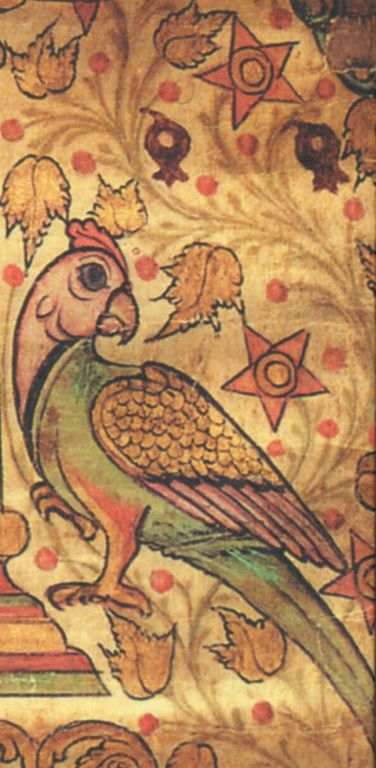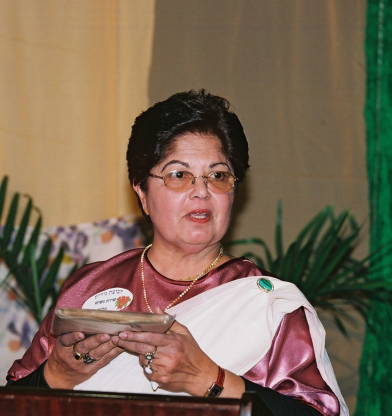2001
33. In the Ship
Simcha Yosef, Hannah Yitzhak. Recorded at NSA studio, August 19, 2001. CD track 11; II-65.
Kappalilě—koḷuṃ kāṯṯuṃ, koḷuṃ kāṯṯuṃ. tta tindaka (x2)
Kappalilě—keṟi vannu, keṟi vannu tta tindaka
Maņavāḷan kappalil, maņavāṭṭi keṟi
Maņavāṭṭi kappalil, maņavāḷan keṟi
Yelayělo-o, yelayělŏ, yělayělo-o—tta tindaka.
1. In the sailing ship—wind and storm, wind and storm! tta tindaka
In the sailing ship—wind and storm, wind and storm! tta tindaka
Into the ship! They entered in; they entered in. tta tindaka
The bride went into the bridegroom’s ship.
The bridegroom entered the ship of the bride.
In the best man’s ship: the bridesmaid is there.
In the bridesmaid’s ship: the best man is there.
Yela yelo-o, yela yelo; yela yelo-o—tta tindaka.2. In the sailing ship—wind and storm, wind and storm! tta tindaka
Made from silk, the sails are made, sails are made. tta tindaka
Made from pearls, the floor is made, floor is made. tta tindaka
From precious silver and velvet and silk,
In green and white color, their clothing is made.
The long sea boat is sailing and searching.
They all sit together, rejoicing and singing.
Yela yelo-o, yela yelo; yela yelo-o—tta tindaka.3. In the sailing ship—wind and storm, wind and storm! tta tindaka
There is the bride; the bridesmaid too. tta tindaka
The bridegroom is spinning like a top. tta tindaka
The best man is captain of the ship.[1]
In Kochi all this is taking place.
In Kochi, in Kochi their journey they take.
In this jubilant journey they shine.
Yela yelo-o, yela yelo, yela yelo-o—tta tindaka.4. In the sailing ship—wind and storm, wind and storm! tta tindaka
In the sailing ship—wind and storm, wind and storm! tta tindaka
Into the ship! They entered in; they entered in. tta tindaka
Now that the big waves are no more,
Our destination we must reach.
Oh where, oh where is our journey’s goal?
Eretz Israel! Eretz Israel! Eretz Israel!
Yela yelo-o, yela yelo, yela yelo-o—tta tindaka.
This Kerala folk-style song, praised by Zacharia for its “enthusiasm and musicality,” was performed at parties during the week after a Jewish wedding. Its portrayal of the bridegroom and bride sailing in a storm-tossed ship perhaps alludes playfully to the excitement of their newly wedded state. Adding to the merriment are the phrases “Yela yelo,” echoing the cries of boatmen calling out to each other over the water as they row, and “tta tindaka,” an imitation of Kerala drum and dance rhythms.
The theme of a pleasure trip by boat is grounded in the culture and coastal geography of Kerala. Although there is no overtly Jewish content in the song until the addition of stanza 4, Lane notes that the word for “velvet” in stanza 2 is characteristic of Jewish, rather than standard, Malayalam.
Our composite English translation of the song incorporates elements of a recorded 2001 performance (stanzas 1 and 2) with additional lyrics from the only known textual version (stanza 3).[2] In the recorded version, the singers left out lines 6 and 7 of the first stanza but sang all 8 lines of the second stanza. Then our translation concludes with a final stanza evidently added in Israel, where folklorist Marcia Walerstein-Sibony heard it sung in 1981 (Walerstein-Sibony 1987, 112). This addition demonstrates the role of ongoing improvisation in such folk songs.
“In the Ship” reached a wider audience through its performance by the popular Israeli vocalist, Etty Ben Zaken. Though not herself Kochini, she performed it in Malayalam, with the Modalius Ensemble (https://www.youtube.com/watch?v=_TJavSwRz78).[3] She has also performed song 34, “Golden Palanquin,” and as of a few years ago was looking forward to including more Malayalam Jewish songs in her repertoire (personal communication, December 13, 2016).
_____________________________
[1] Zacharia (2005:200) suggests an alternative translation of lines 3 and 4 of this stanza:
The bride is the ship, the groom is the mast.
The best man is captain, the bridesmaid the sail.
[2] This text was found written on a loose sheet of paper in notebook S-13, belonging to the family of Simcha Yosef, one of the singers. Her family was from Kadavumbhagam-Kochi.
[3] Accessed August 1, 2022.






